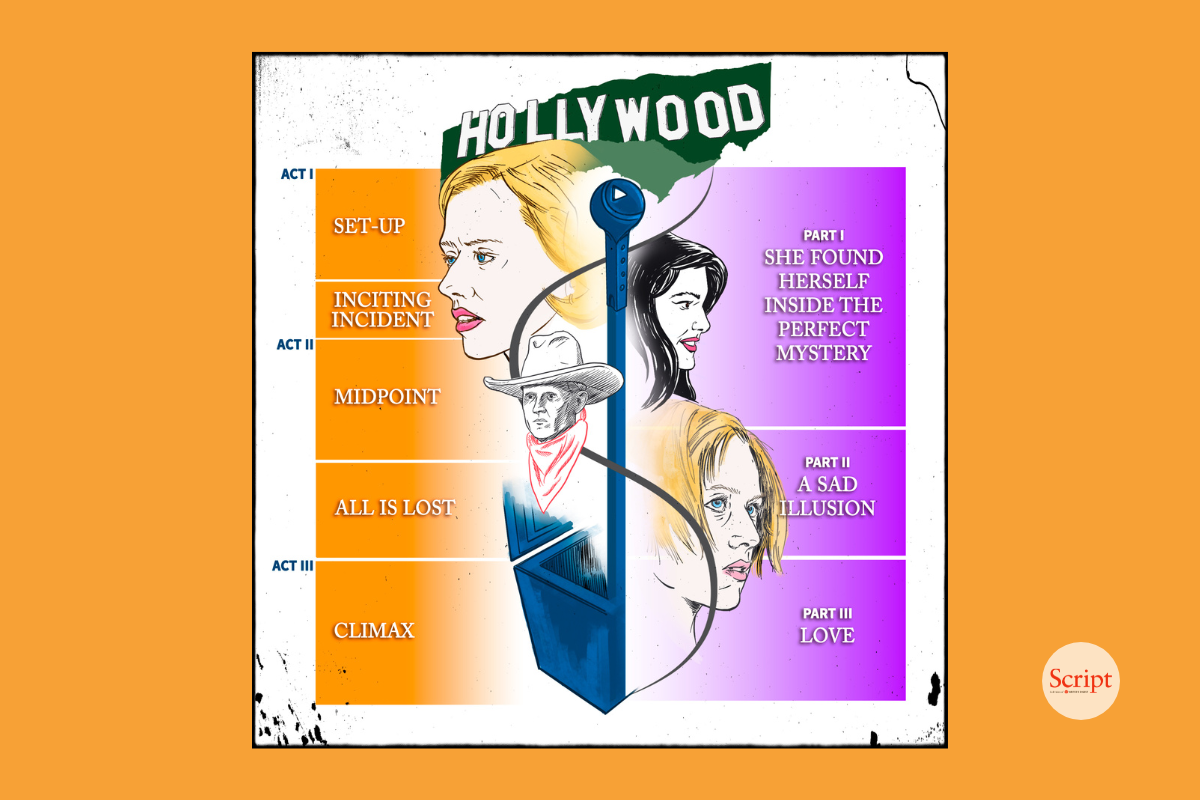Between my regular gigs and my participation in a few contests, I’ve been reading a lot of specs lately and have come to realize an essential truth: good scripts are like snowflakes – each one is unique. A terrific screenplay unfolds in its own fresh and original manner – it doesn’t follow any sort of pattern and you can never predict where it is going or how it is going to get there. Bad scripts, however, are entirely predictable – they tend to follow a pretty specific pattern, you can always tell where they’re going, and you usually get there way ahead of them.
Here’s how all the bad scripts I’ve been reading lately tend to go:
FADE IN:
On an establishing shot of whatever city the story takes
place in.
On some small detail of a bigger picture that we are as yet
unable to comprehend.
OPENING VOICEOVER
In which the protagonist (whom we
haven't met yet) either says
something folksy to let us know how
"real" and "regular" he/she is OR
says something cryptic that is
meant to intrigue us and pull us
into the story OR says something
snide and sarcastic but allegedly
perceptive so we will know how
hip/ironic/cool/jaded and deep the
protagonist is (this last is by far
the most common).
The voice-over leads into:
INT/EXT. SOME PLACE – DAY/NIGHT
Because we all love J. J. Abrams so much, we open with a
scene from the middle of the story that introduces us to the
PROTAGONIST in a precarious, "how's he ever going to get out
of this one?" situation. As this scene reaches a tense
climax, we
CUT TO:
SEVERAL DAYS OR WEEKS OR MONTHS EARLIER
Because it is now a federal law that no screen story can
unfold in chronological order and must include a flashback on
the very first page of the script. This flashback is always
accompanied by a
SUPERED TITLE: That tells us is it several days or weeks or
months earlier.
The MAIN CHARACTERS are then introduced, usually in
individual vignettes that are meant to give us a sense of
each character's personality and that frequently end with
freeze frames of the characters in the midst of some defining
action, accompanied by
SUPERED TITLES: That tell us the primary characters' names.
This gimmick is absolutely required if the characters have
cool/goofy nicknames that mean nothing to us, such as Funky
Dave, T-Dope, and The Master.
We then move on with the actual story, which will unfold in one of two ways:
There will be 30 - 40 pages of narrative that sets up a
specific narrative that will then be dropped and the script
will them veer off into a completely different tale that has
nothing to do with the one that we just invested a half hour
in reading.
There will be 30 – 40 pages of material devoted to developing
a character that, as it turns out, plays either a minor or
completely inconsequential role in the overall plotline
before finally setting down into the actual story.
Each scene in the script will then be introduced by an overlong slug that forgets that the purpose of a slug is simply to tell the key members of the production team where a scene is set, whether that place is inside or outside, and whether or not the scene needs to take place during the day or at night. Instead, slugs in a bad script will attempt to tell part of the story, fill us in on character backstory, and/or set a particular mood while never, ever making up its mind where the scene is supposed to take place. Here’s an example:
INT/EXT. DAVE'S CAR – AN OLD CLUNKER HE BOUGHT FROM HIS
GRANDFATHER JUST BEFORE THE OLD MAN PASSED AWAY – DRIVING ON
THE FREEWAY THAT LEADS FROM HIS HOUSE IN HARTFORD TO HIS NEW
JOB IN BRIDGEPORT – IN THAT TIME EARLY IN THE MORNING WHEN
THE LIGHT IS JUST BEGINNING TO APPEAR IN THE SKY AND YOU
CAN'T TELL WHETHER IT IS DAY OR NIGHT – CLOSE SHOT FAVORING
DAVE AND THE ROAD SHOULDER PASSING BY OUTSIDE -- DAWN/DUSK.
The script will contain lots of important story information written into its action lines but that is never dramatized in any way that will allow that information to be communicated to an audience. For example:
As Dave drives, he thinks back to that day fifteen years ago
when he last saw Kristen standing on the front steps of their
high school. Since then many years have passed during which
Dave has traveled the world, fought in three wars, and
married a woman in Tanzania who died tragically in a freak
jeep accident, after which Dave suffered a nervous breakdown
and spent time in a French mental hospital. After being
released and earning a degree from the Sorbonne, he returned
to the U.S. to look for work. As luck would have it, he was
hired by the same company where Kristen works. As Dave nears
the company h.q., he wonders if his first love will be happy
to see him or if more tragedy awaits.
DIALOGUE
In homage to Quentin Tarantino
(yes, as hard as it is to believe,
we're still paying homage to him),
there will be lots of long
digressive speeches in which the
characters discuss pop culture or
offer observations about people,
life, and society that have
absolutely nothing to do with the
main story.
Lots of long speeches filled with
awkward exposition that the author
was not otherwise able to work into
the story. For example, "So Dave,
how have you been since you got
back from France six months ago."
"Pretty good, Steve." "How were
conditions in that mental hospital
you got committed to after your
girlfriend died in a freak jeep
accident?" "They were pretty good.
The nurses were nice and helped me
get the books I needed to study for
the entrance exam I had to take to
get into the Sorbonne." 'You got
in, didn't you?" "Yes, I spent
three years there studying
political science and art history."
"That should make you a shoe-in for
the political art historian
position at that company in
Bridgeport where Kristen, your old
girlfriend, works." "I sure hope
so."
Characters will do all sorts of things, often for reasons
that are not the least bit clear or understandable.
There will be lots of action scenes.
All of them will be written in short, lone sentences.
So that they will be easy to read on the page.
And give a sense of fake urgency mean to approximate the
hoped-for intensity of the eventually-filmed sequence.
We will read lots of sentences.
That use the word "we" to make us feel like "we" are in the
action.
The scenes will go on and on, filled with so much detail
about the geography of the location…
…and the physics of the action that it will be impossible for
"we" to tell what is going on.
There will also be lots of DETAILED SHOT DESCRIPTIONS and
CAMERA MOVES indicating how the writer wants the film
directed. There will be so many that the storyline will
frequently get completely lost amid the clutter.
Lots and lots of songs will also be indicated. In some cases,
the writer will indicate the exact lines of the song he/she
wants playing over the exact actions occurring onscreen.
If this script ever gets made into a film, all of these shot
descriptions and musical choices will be totally ignored by
the filmmakers.
About 3/4 of the way through the script, the story will catch
up to the first scene and carry on from there - a structural
choice has become immensely popular in recent years but that
has no narrative logic whatsoever.
All of this will build towards a climax that can turn out in
only one of two ways. Despite this, the story will turn out
in some third way that makes no sense and is completely
unsatisfying.
CLOSING VOICEOVER
Summing up what we have seen and
telling us what lesson we're
supposed to take away from
everything that has just happened.
Most of this will be completely new
to us.
FADE OUT:
THE END
Written promise (threat?) that the saga will continue in a
sequel script that the author is already hard at work on.







